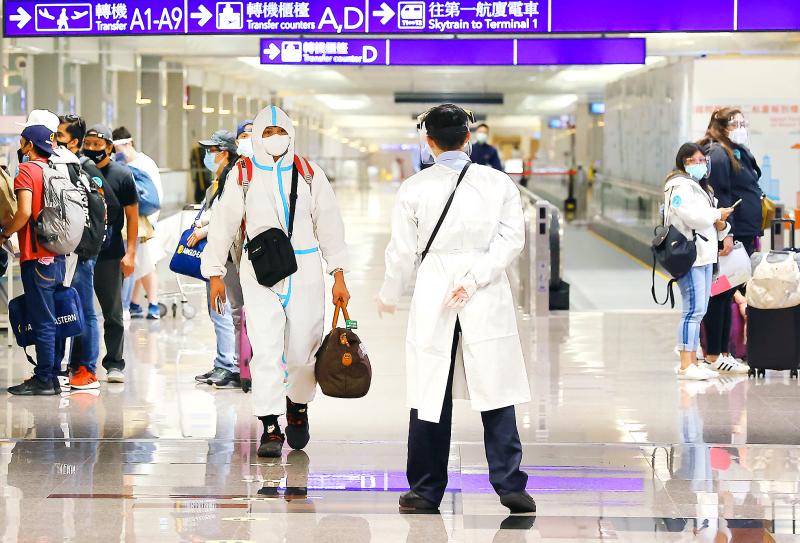Taiwan is aiming to ease its strict COVID-19 quarantine policy from next month as it needs to gradually resume normal life and reopen to the world, the government said yesterday.
Since the COVID-19 pandemic began two years ago, Taiwan has succeeded in keeping reported cases below 20,000, having enforced a blanket two-week quarantine for everyone arriving in the nation, even as large parts of the rest of the world have reopened.
Speaking at a meeting with senior health officials, Premier Su Tseng-chang (蘇貞昌) said that even though there could be further domestic infections, the government was “quite confident” in its disease prevention measures.

Photo: Chu Pei-hsiung, Taipei Times
“The government must also take into account livelihoods and economic development, gradually return to normal life and step out to the world,” the Executive Yuan cited Su as saying.
On the precondition that there are sufficient medical supplies and preparations, and that the vaccination rate continues to rise, Su said that he had asked the Central Epidemic Command Center to “consider whether reasonable and appropriate adjustments” should be made to the quarantine and entry policy for businesspeople.
Minister of Health and Welfare Chen Shih-chung (陳時中), who heads the center, said that it would aim to cut the quarantine period from 14 days to 10 days before the middle of next month, confident that it could detect any infections within that period with testing.
“Basically, we can relax epidemic prevention” measures, Chen said.
Asked whether quarantine could be done away with completely before the summer holidays, Chen said: “The possibility is not high.”
About 30 percent of the nation’s 23.5 million people have now had a booster dose of COVID-19 vaccine, a figure that is gradually rising, and the government has said that it wants to get that to 50 percent before easing entry requirements.
Taiwan has never gone into full lockdown during the pandemic and has never closed its borders, although arrivals have generally been limited to Taiwanese and foreign resident certificate holders.
Chen said business travelers would be able to return and would have to do the same 10-day quarantine, but he could not offer a time frame on allowing tourists back in.
The center is dealing with a handful of new domestic COVID-19 cases per day, all as a result of the more infectious Omicron variant of SARS-CoV-2.
Officials have said they are confident they can contain those outbreaks.

A Ministry of Foreign Affairs official yesterday said that a delegation that visited China for an APEC meeting did not receive any kind of treatment that downgraded Taiwan’s sovereignty. Department of International Organizations Director-General Jonathan Sun (孫儉元) said that he and a group of ministry officials visited Shenzhen, China, to attend the APEC Informal Senior Officials’ Meeting last month. The trip went “smoothly and safely” for all Taiwanese delegates, as the Chinese side arranged the trip in accordance with long-standing practices, Sun said at the ministry’s weekly briefing. The Taiwanese group did not encounter any political suppression, he said. Sun made the remarks when

The Taiwanese passport ranked 33rd in a global listing of passports by convenience this month, rising three places from last month’s ranking, but matching its position in January last year. The Henley Passport Index, an international ranking of passports by the number of designations its holder can travel to without a visa, showed that the Taiwan passport enables holders to travel to 139 countries and territories without a visa. Singapore’s passport was ranked the most powerful with visa-free access to 192 destinations out of 227, according to the index published on Tuesday by UK-based migration investment consultancy firm Henley and Partners. Japan’s and

BROAD AGREEMENT: The two are nearing a trade deal to reduce Taiwan’s tariff to 15% and a commitment for TSMC to build five more fabs, a ‘New York Times’ report said Taiwan and the US have reached a broad consensus on a trade deal, the Executive Yuan’s Office of Trade Negotiations said yesterday, after a report said that Washington is set to reduce Taiwan’s tariff rate to 15 percent. The New York Times on Monday reported that the two nations are nearing a trade deal to reduce Taiwan’s tariff rate to 15 percent and commit Taiwan Semiconductor Manufacturing Co (TSMC, 台積電) to building at least five more facilities in the US. “The agreement, which has been under negotiation for months, is being legally scrubbed and could be announced this month,” the paper said,

Japan and the Philippines yesterday signed a defense pact that would allow the tax-free provision of ammunition, fuel, food and other necessities when their forces stage joint training to boost deterrence against China’s growing aggression in the region and to bolster their preparation for natural disasters. Japan has faced increasing political, trade and security tensions with China, which was angered by Japanese Prime Minister Sanae Takaichi’s remark that a Chinese attack on Taiwan would be a survival-threatening situation for Japan, triggering a military response. Japan and the Philippines have also had separate territorial conflicts with Beijing in the East and South China